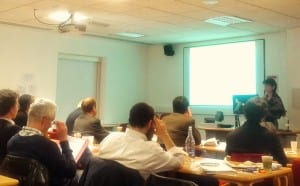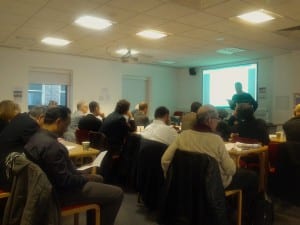Calendars and Religion in Antiquity and the Middle Ages
By uclhibu, on 12 March 2015
Calendars and Religion in Antiquity and the Middle Ages, the fourth workshop of our ERC project ‘Calendars in Antiquity and the Middle Ages’, took place on 18 February 2015. With this workshop, we aimed to investigate the interaction between religion and calendars; in particular, we sought to understand whether religion has been the main factor in the formation of calendars, as may be assumed in view of the massive presence of religious content in most calendars.
In line with the multidisciplinary nature and the broad temporal scope of our project, this workshop’s programme included very varied papers, which were arranged chronologically, from Antiquity to the Middle Ages. After a brief but insightful Introduction by Sacha Stern (UCL), who emphasised how, in the time frame under consideration, the evolution of religion and calendars appears to have proceeded according to a similar pattern, from plurality to an ever increasing unity, Alasdair Livingstone (Birmingham) brought us to ancient Babylonia. His paper focussed on Babylonian Hemerologies, a large variety of texts whose common function was to determine the propitiousness or lack of it for each day of the year, often with regard to a specific activity. As one might expect, religious and cultic aspects were frequently involved in this calendrical practice. Jörg Rüpke (Erfurt) looked at the role played by religion in the Roman calendar during the Republican and early Imperial period. He argued that whilst religion was not directly related to the Republican calendar, which, in his opinion, was essentially a political-legal one, the Augustan period marked a turning point in the process of increasing inclusion of religious elements into the calendar. The ‘Feriale Duranum’, which is generally regarded as the only extant example of festival calendar used by the Roman army, was the subject of Ted Kaizer’s talk (Durham). This calendar was written on papyrus in the time of Severus Alexander (222-235 CE) and was found along with an impressive archive of documents at Dura-Europos in modern Syria. Kaizer explained how the military character of this calendar, which lists a series of festivals to be observed throughout the year, has in fact been questioned by scholars, and argued for a Palmyrene origin of some entries in the calendar.
Moving to the early Medieval period, James Palmer (St Andrews) showed that the synchronisation of the liturgical calendar, as the dispute about the date of Easter clearly exemplifies, seems to have played a key role in the Carolingian world (740-900 CE). François de Blois (UCL) spoke on ‘the ancient calendar at Mecca and the origin of the Islamic calendar’. He submitted the sources concerning the Arab calendar before Islam to a critical analysis and proposed a new hypothesis concerning the time and circumstances of the introduction of the Islamic calendar and the era of the Hijra. Nadia Vidro’s (UCL) talk explored medieval Jewish attitudes towards the unanimity of religious practice and the role of calendar in uniting the Jewish community or splitting it into factions, one desecrating the holy day of another. The diversity of these papers which, nonetheless, dealt with similar themes, along with the presence of distinguished experts in the various disciplines involved, generated several stimulating discussions and made this workshop particularly fruitful.
 Close
Close



